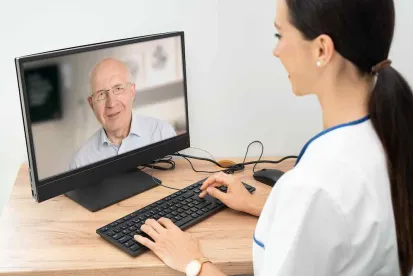“We’re still feeling the impacts of coronavirus, especially in older and more vulnerable populations, which is why these telehealth services must be extended.”- U.S. Senator Catherine Cortez Masto
On February 7, 2022, Senators Catherine Cortez Masto (D-NV) and Todd Young (R-IN) introduced the Telemedicine Extension and Evaluation Act, an important bipartisan legislation to ensure predictable patient access to telehealth following the end of the public health emergency, allow more time to gather data around virtual care utilization and efficacy, and avoid a sudden drop-off in access to care (known as the telehealth cliff).
What is the Telehealth Extension and Evaluation Act?
The Telehealth Extension and Evaluation Act would establish a two-year extension for certain COVID-19 emergency telehealth waivers. The legislation aims to extend the waivers of the geographic and site restrictions and allow Medicare beneficiaries to access telehealth even when at home; allow controlled substances to be prescribed via an initial telehealth encounter under the Ryan Haight Act; and extend Medicare payment flexibilities for Rural Health Centers (RHCs), Federally Qualified Health Centers (FQHCs), and Critical Access Hospitals (CAHs). To address Medicare program integrity concerns, the bill also introduces in-person restrictions on telehealth orders for certain high-cost durable medical equipment (DME) and laboratory tests. It also contains language that might serve to restrict the use of “incident to” billing for telehealth services.
“The waivers were a key part in allowing healthcare providers to meet patients where they live, and we risk reversing the great progress we have seen if we go back to the way things were prior to the pandemic.”
- René Quashie, Vice President, Policy and Regulatory Affairs, Digital Health, Consumer Technology Association
The bill follows an advocacy letter signed by 336 organizations, co-led by the American Telemedicine Association and other leading stakeholders, urging Congressional leaders to continue the current telehealth waivers and enact permanent, evidence-based telehealth legislation for implementation in 2024.
Key Takeaways for the Telehealth Industry
Here are the key takeaways on how the new legislation may affect the telehealth industry.
1. General Extension of Medicare Payment for Telehealth Services
Under the CARES Act, Congress gave CMS authority to waive certain limitations on Medicare coverage and payment for telehealth services furnished to Medicare beneficiaries, clearing the way for Medicare beneficiaries to receive care in their homes. If passed into law, the Telehealth Extension and Evaluation Act would extend certain Medicare telehealth payment waivers on originating site and geographic location limitations, expand the list of permissible telehealth providers, and broaden the availably of audio-only telehealth services for Medicare beneficiaries for two years after the public health emergency ends. Read our prior coverage here and here.
2. Telemedicine Controlled Substance Prescribing
The Ryan Haight Online Pharmacy Consumer Protection Act of 2008 (Ryan Haight Act) largely prohibits healthcare providers from prescribing controlled substances via telehealth without having previously performed an in-person medical evaluation of the patient. In connection with pandemic DEA waivers, federal law has allowed DEA-registered practitioners to prescribe controlled substances without a prior in-person medical evaluation of the patient, provided the telemedicine technology uses interactive audio-visual communications and complies with state law. The proposed legislation would extend this flexibility for an additional two years after the public health emergency ends.
3. Extension for FQHCs and RHCs
Prior to the pandemic, FQHCs and RHCs were limited to serving as an originating site (the location of the patient) for telehealth services. The proposed legislation would extend flexibilities put into place by the CARES Act, allowing FQHCs and RHCs to serve as distant sites (the location of the practitioner) for an additional two years after the expiration of the public health emergency.
4. Extension for CAHs
In March 2020, through its “Hospitals without Walls” program, CMS began allowing hospitals to provide services outside their hospital buildings for the duration of the public health emergency. To ensure CAHs can continue to offer telehealth services after the sunset of the public health emergency, the proposed legislation would add CAHs as a distant site provider of telehealth services.
5. Restrictions for Certain DME and Lab Tests
The proposed legislation would require that the ordering clinician conduct an in-person exam of the patient no earlier than 12 months prior to ordering certain high-cost lab tests and high-cost DME products via telehealth. “High-cost” is defined as DME products and lab tests in the most expensive quartile of all products and tests for the particular year. The legislation also would instruct Medicare Administrative Contractors to audit outlier practitioners (i.e., practitioners who conduct 90% or more of their orders for DME or lab tests via telehealth). These requirements would be in place during the two-year period beginning the day after the public health emergency ends. In the last few years, the Department of Health and Human Services (HHS), Office of Inspector General (OIG) has conducted several large investigations of “telefraud” schemes involving high cost DME and lab tests with questionable medical necessity. These restrictions are intended to help curb fraud and abuse, distinguishing such telefraud schemes from arrangements involving the legitimate use of telemedicine technology to deliver medical care.
6. Requirement to Submit NPI Number for Telehealth Billing
In order to bill Medicare directly, practitioners must register for a national provider identifier (NPI). Under certain conditions, Medicare pays for services that are billed by physicians but performed by non-physician staff acting under the supervision of the physician. This practice, allowed under Medicare rules, is known as “incident to” billing. The legislation states that, for the two-year period beginning the day after the public health emergency ends, “payment may not be made for telehealth services furnished by a physician or practitioner unless such physician or practitioner submits a claim for payment under the national provider identification number assigned to such physician or practitioner.” Although the language of the bill is not well-defined, it clearly requires all practitioners to obtain an NPI number to receive Medicare payment for telehealth services. But it could also be interpreted to prohibit or restrict “incident to” billing for telehealth services.
7. Study on COVID-19 Related Telehealth Changes under Medicare & Medicaid
The legislation would require HHS to study the impact of the pandemic telehealth flexibilities and deliver a report to Congress no later than 18 months after the end of the public health emergency. In conducting the study, HHS would consult with the Medicaid and CHIP Payment and Access Commission, the Medicare Payment Advisory Commission, OIG, industry stakeholders, and people of racially, ethnically, geographically, and professionally diverse perspectives. The report would include at least:
-
A summary of utilization of all Medicare services furnished during the public health emergency (broken down by service type and modality);
-
A description of any changes in utilization over the course of the public health emergency, and compared to prior to the public health emergency;
-
An analysis of utilization of telehealth services broken down by demographic characteristics of beneficiaries (e.g., race, ethnicity, geographic region, and income level);
-
A description of costs and savings, instances of fraud identified by the OIG, privacy concerns, and recommendations for which flexibilities should be made permanent.
Beginning January 1, 2023, the Act would also make available grant funding to state Medicaid programs to conduct similar reports.
We will continue to monitor progress of the Telehealth Extension and Evaluation Act and other developments on telehealth policy applicable post-public health emergency, so please check back for updates.





 />i
/>i

